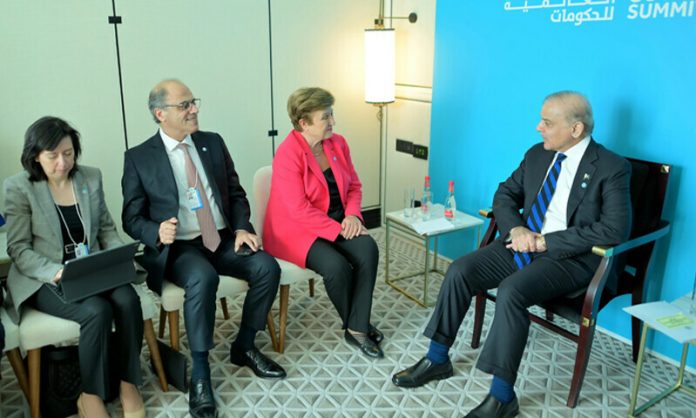( Asghar Ali Mubarak )
ISLAMABAD (TNS) The federal government and the International Monetary Fund (IMF) have agreed on a new agreement of $1.3 billion and both sides have also agreed on the first review of the ongoing 37-month bailout program. The government can get $1.3 billion under the new 28-month climate-friendly flexible loan program until the board approves it. This will also provide Pakistan with $1 billion under the $7 billion bailout program, which will take the amount received by Pakistan to $2 billion.
Prime Minister Shehbaz Sharif has said that a staff-level agreement has been reached between Pakistan and the International Monetary Fund (IMF). The opponents shouted that the mini-budget has come now, but thank God, the mini-budget did not come. A meeting of the federal cabinet was held under the chairmanship of the Prime Minister. Addressing the meeting, the Prime Minister said that in the recent period, we as a nation have faced many challenges including inflation and terrorism, especially the common people have endured difficulties. If it were not for their sacrifices, this agreement with the IMF would have been impossible. He said that on the agreement with the IMF, I congratulate Finance Minister Muhammad Aurangzeb, Deputy Prime Minister Ishaq Dar, Planning Minister Ahsan Iqbal, Commerce Minister, and all the relevant ministers, institutions and their heads, especially the Army Chief. The Chief Ministers of all the provinces also contributed their share. If it were not for the hard work of all of you, this agreement would not have been possible so quickly. The Prime Minister said that a captain cannot do anything alone, there is a captain in a team of 11 people. Compared to the previous year, revenue collection increased by 26 percent, and the inflation rate decreased historically. He said that tax cases worth trillions of rupees have been pending in the courts for years. Whose fault is it, the courts or the FBR? Only time will tell. Just think, due to the government’s efforts, Rs 34 billion came to the treasury in a few weeks. Now we have allocated all our attention to handling these cases so that this money can come to the national treasury and become an ocean drop by drop. He said that work is going on rapidly on the digitization of the FBR. Now, in the hiring of tribunals, professional chartered accountants and corporate lawyers are being brought in. Such people are being brought in on the basis of market competition. All this is being done on merit without any recommendation under the supervision of a Supreme Court judge. Shahbaz Sharif said that OSD officers used to be sent by the FBR to pursue tax cases in the courts. Now we are going a step ahead to supervise it ourselves. I have chosen the sugar sector myself in the matter of sales tax evasion. There is a difference of Rs 12 billion in sales tax collection in the first 3 months of last year and the current fiscal year. This is the first time that sales tax has been collected more from the sugar industry, and an additional Rs 60 billion in sales tax is expected to be collected at the end of the fiscal year. The meeting also offered Fateha on the death of Army Chief General Asim Munir’s mother. Meanwhile, the federal cabinet meeting’s statement said that the solar net metering regulations have been directed to be re-submitted after further consultation with stakeholders. The federal cabinet was briefed on the $1.3 billion loan agreement with the IMF. The statement said that the first review of the $7 billion agreement with the IMF has been completed. The Prime Minister said that the IMF appreciated the government’s steps to improve governance. According to the announcement, CCPA was approved to sign revised agreements for power generation from bagasse, as well as the Whistleblower Protection and Vigilance Commission Act 2025 was given in principle approval. The announcement said that amendments to the Income Tax, Sales Tax on Services, FDE laws have been approved for Islamabad, as well as the Income Tax Amendment Bill regarding the restoration of tax rebate on the income of permanent faculty and researchers. It was further informed that the federal cabinet ratified the decisions of the Cabinet Committee on Privatization of March 11, and the decisions of the ECC of March 13 and 21 were also ratified. The announcement said that the solar net metering regulations have been directed to be re-introduced after further consultation with stakeholders. Approval has been given to pass on the benefit of reduction in the prices of petroleum products to electricity consumers. It should be noted that on March 13, 2025, the Economic Coordination Committee (ECC) had approved amendments to the net metering regulations to reduce the increasing financial burden on grid users, in which it was decided that electricity would be purchased from solar users at Rs 10 per unit. The announcement said that due to solar net metering, grid-connected users were having to pay heavy bills, the number of solar net metering users was 283,000 as of December 2024. The announcement of the Ministry of Finance stated that Rs 159 billion was paid to solar net metering users last year, and if reforms are not made, the payment burden could reach Rs 4,240 billion by 2034. The announcement further said that 80 percent of solar net metering users are located in 9 major cities and posh areas. On the agreement of the federal government and the International Monetary Fund (IMF) on a new agreement of $1.3 billion, IMF Mission Chief to Pakistan Nathan Porter said that the IMF team has signed a Staff Level Agreement (SLA) with Pakistani authorities on the first review of the 37-month extension arrangements under the Extended Fund Facility (EFF) and a new 28-month agreement under the IMF’s ‘Resilience and Sustainability Trust’, with a total access of about $1.3 billion over 28 months. A statement issued by the IMF said that Pakistan had requested $1 billion from the IMF’s RSF in October. Funding under the RSF is provided to countries that commit to high-quality reforms to build resilience against climate disasters through adaptation. The loan is repayable over 30 years, including a 10-year grace period, and is generally cheaper than the terms of the EFF, such as the ongoing $7 billion loan program. The program, which was secured in mid-2024, has played a key role in stabilizing the economy and the government has said that the country is on the path to long-term recovery. Over the past 18 months, Pakistan has made significant progress in restoring macroeconomic stability and rebuilding confidence despite a challenging global environment. The IMF mission chief added that after the approval of the IMF board, Pakistan will have access to about $1 billion under the EFF, bringing the total disbursement under the program to $2 billion. The IMF official said about Pakistan that while economic growth is moderate, inflation has fallen to its lowest level since 2015, fiscal conditions have improved, sovereign debt spreads have narrowed significantly, and the external balance is strong. The Finance Ministry said in its monthly economic outlook that inflation is likely to rise to 3 percent in April after slowing to its lowest level in almost a decade last month. Inflation has been declining for several months, reaching 1.5 percent in February after soaring to nearly 40 percent in May 2023. It also said that downside risks to commodity prices such as geopolitical issues, tightening global financial conditions or rising protectionism have increased. The statement said that such risks could undermine Pakistan’s “hard-won macroeconomic stability”. It added that climate-related risks remain a key challenge for Pakistan, requiring resilience, including adaptation measures. According to the International Monetary Fund, in this regard, it is important to continue the progress achieved over the past year and a half, further strengthen public finances, ensure price stability, rebuild external buffers and address weaknesses in support of strong, inclusive and sustainable private sector-led growth. The Fund noted that Pakistan reiterated its commitment to the EFF-supported program and intends to strengthen its efforts by advancing reforms under the RSF-backed agreement. The report said that the government’s policy priorities include continuing fiscal consolidation to reduce public debt, creating space for social and development spending, making further progress on fiscal structural reforms, maintaining an appropriately tight fiscal policy, continuing cost-cutting reforms in the energy sector to reduce tariffs; and stepping up climate reform efforts. Finance Minister Muhammad Aurangzeb expressed optimism about the results of the government’s policies under the agreement with the IMF. “We are committed to staying on track and implementing structural reforms in the areas of taxation, energy, and state-owned enterprises (SOEs) to put our country on the path of sustainable productivity and export-led growth,” the report said. The government says the $350 billion economy has been stabilized under a $7 billion IMF bailout package, helping it avoid the risk of default. The government was waiting for an IMF agreement, which would see the first review of the bailout package and the disbursement of $1 billion ahead of the annual budget, which is usually presented in June. It should be remembered that on March 3, 2025, an International Monetary Fund (IMF) delegation arrived in Pakistan for negotiations on a one billion dollar tranche and the economic review negotiations continued until March 14. The first review negotiations were held under a $7 billion loan program. Upon the success of the review, an installment of about $1 billion will be released to Pakistan. In the second phase, policy-level negotiations will be held between Pakistan and the IMF. Pakistan will submit an implementation report on the terms of the $7 billion loan program. Pakistan will submit the first half-year report of the current fiscal year to the IMF. The IMF delegation will meet with officials from the Ministry of Finance, FBR and State Bank. It should be remembered that on February 12, 2025, the Managing Director (MD) of the International Monetary Fund (IMF) Kristalina Georgieva had admitted that Pakistan is moving towards development after the economy stabilized. In a meeting with Prime Minister Shehbaz Sharif, Kristalina Georgieva had appreciated the efforts of the Government of Pakistan for effectively implementing the IMF program. Prime Minister Shehbaz Sharif met IMF Managing Director Kristalina Georgieva on the sidelines of the World Government Summit (WGS) in Dubai to discuss Pakistan’s ongoing IMF program and the macroeconomic stability achieved through government reforms. The meeting highlighted Pakistan’s commitment to implementing institutional reforms and maintaining fiscal discipline, which are key to restoring Pakistan’s economic stability and sustainable growth and future in the country. Prime Minister Shehbaz Sharif highlighted the importance of the progress made under the IMF’s Extended Fund Facility, which has played a key role in stabilizing Pakistan’s economy and putting it on the path to long-term recovery. The Prime Minister reiterated the government’s commitment to maintaining the pace of reforms, especially in key areas such as tax reform, improved energy sector performance and private sector development. The Prime Minister assured Managing Director Kristalina Georgieva of the government’s commitment to Pakistan’s economic stabilization strategy, effective implementation and sustainability of the plan, which are key components for achieving inclusive and sustainable growth in Pakistan. IMF Managing Director Kristalina Georgieva, while appreciating the efforts of the government of Pakistan in effectively implementing the IMF-supported program, said that the country’s economy is moving towards growth after stabilization and is performing well with low inflation. She also acknowledged that Pakistan is on the path of growth after achieving economic recovery. Kristalina Georgieva also praised the leadership and personal commitment of Prime Minister Shehbaz Sharif in implementing the country’s reform agenda, who has played a significant role in achieving economic stability and growth in Pakistan. The IMF Managing Director reiterated the IMF’s commitment to supporting Pakistan’s reform agenda, emphasizing the importance of continued fiscal discipline, institutional reforms, and effective governance to ensure long-term economic stability.















